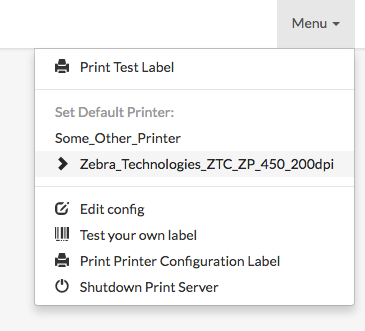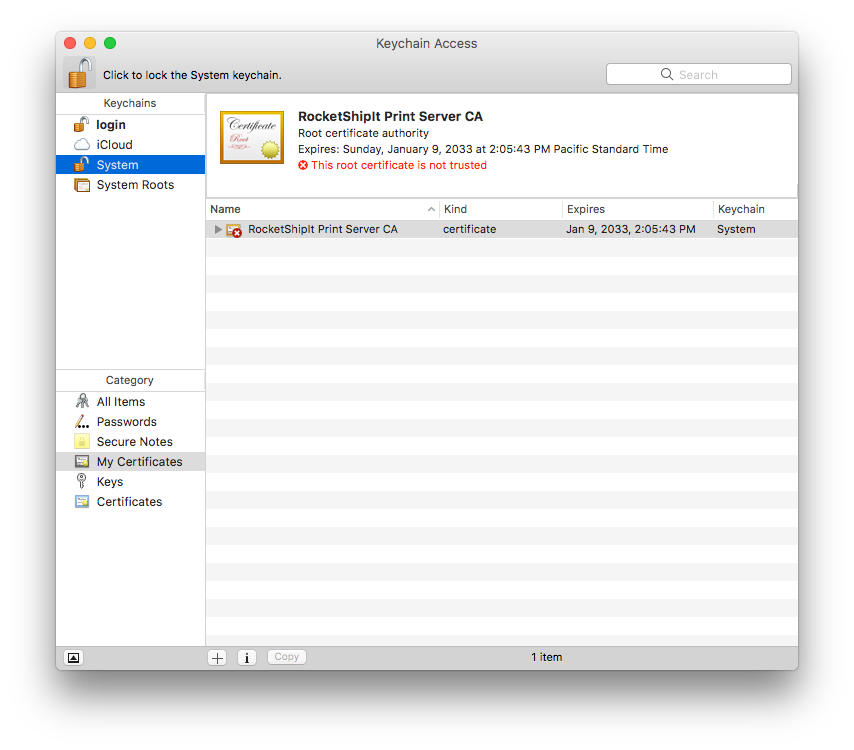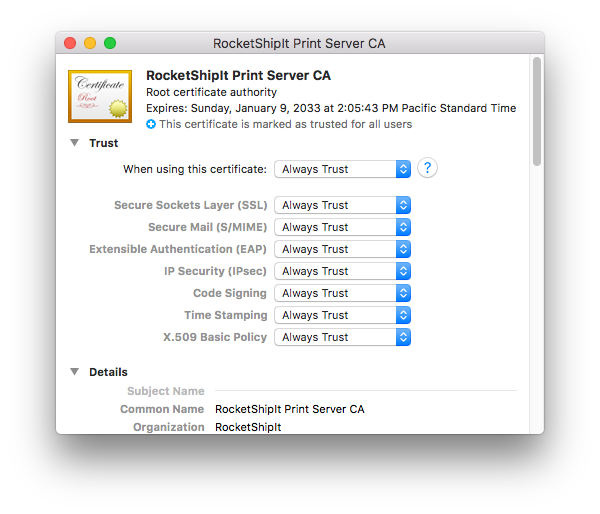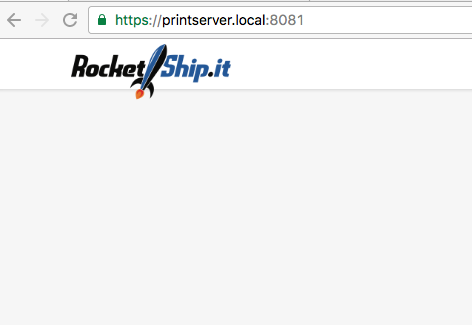Thermal Printing¶
The Problem: Thermal printers don’t use PostScript and therefore need a special set of instructions sent to them via raw text. Web browsers don’t support this for security reasons and because 99% of people use PostScript compatible printers.
The Solution: Use one of these options:
RocketShipIt Print Server¶
RocketShipIt Print Server is a web server typically ran on the machine that is hooked up to the printer; although, this can also print remotely.
You will then send a base64 label to this server via HTTP POST which will then send the decoded base64 label directly to the thermal printer. This server requires no installation and can be run anywhere. RocketShipIt Print Server is cross compatible (tested on Windows, Linux, Mac, and now ARM (Raspberry Pi).
Several advantages include:
- Ability to automatically print without user interaction (no clicking of a print button) and set up queues.
- Written by RocketShipIt and includes documentation.
- If configured it can be called from remote computers or across the internet via HTTPS
- Ability to have multiple shipping stations configured and distribute load across workstations.
Notable Features
- Cross Compatible (Windows, Mac, Linux, ARM via Raspberry Pi)
- Heat beat sensor, periodically pings a URL of your choice indicating live printers available from pool.
- Posts print and other valuable data back to a URL of your choice, useful for monitoring all printers from a central location
Setup¶
There is no setup!
Simply download the RocketShipIt print server from your My Account page and execute it. After the server starts, your default browser should open to the welcome page.
Configuation¶
The RocketShipIt Print Server will detect all available printers. You can switch printers from the web interface by clicking the dropdown and selecting the thermal printer you wish to send labels to.

Then press Print Test Label to print a sample label. Please note that this test label is in EPL format which should work for most printers but not all. This test print usually works but if it doesn’t, don’t worry. It may mean that your printer needs ZPL or another format which you can send via HTTP POST.
Sending Labels¶
To send labels to the RocketShipIt Print Server simply do a application/x-www-form-urlencoded HTTP post to the print server url (default is http://localhost:8080).
The easiest way to do this which also works from over the internet is to create a PHP page on your webserver and output a form on a page like this:
<form method="post" action="http://localhost:8080">
<input type="hidden" name="label" value="<?php echo $base64Label; ?>" />
<input type="submit" value="Print" />
</form>
Then navigate to this page from the computer hooked up to the printer with the RocketShipIt Print Server running and click the Print button. Since the computer you are currently on is hooked up to the printer and is localhost it will print.
Note
It is a common misconception and can be confusing but the RocketShipIt Print Server does not need to be exposed to the internet (although it can) in order to be effective using this method. The actual label is generated server side and already downloaded to the page which you just navigated to. The form posts to http://localhost:8080 which routes directly to the computer you are currently on. This is how the label can be sent to your printer even though the printer and the RocketShipIt Print Server are never actually exposed to the internet.
Once you have this working, you may want to automate this further. For example you can use JavaScript to automatically open a window and click this print button for you. You may want to send the label directly via cURL or some other means. As long as it is sent via HTTP and the name of the param is label it will print.
Sending Multiple Labels at Once¶
You can also send many labels in one request:
<form method="post" action="http://localhost:8080">
<input type="hidden" name="label[]" value="<?php echo $base64Label; ?>" />
<input type="hidden" name="label[]" value="<?php echo $secondBase64Label; ?>" />
<input type="submit" value="Print" />
</form>
Or use:
<form method="post" action="http://localhost:8080">
<input type="hidden" name="label" value="<?php echo $base64Label; ?>" />
<input type="hidden" name="label" value="<?php echo $secondBase64Label; ?>" />
<input type="submit" value="Print" />
</form>
POST Parameters¶
| Parameter | Description |
|---|---|
| label | The base64 encoded ZPL,EPL,PNG,JPG or GIF label you wish to print |
| label[] | Send multiple base64 encoded labels in one request |
| redirect_url | (optional) URL to redirect to after POST |
| printer | (optional) override default printer specified in config for this request |
| label_width | (optional) Default: 4.0, value in inches, used for automatic resizing, centering, and more |
| label_height | (optional) Default: 6.0, value in inches, used for automatic resizing, centering, and more |
| dpi | (optional) Default: 200, used for automatic resizing, centering, and more |
| starting_point_x | (optional) Default: 0, starting point for x axis |
| starting_point_y | (optional) Default: 0, starting point for y axis |
More Configuration¶
The configuration of the RocketShipIt print server is done by editing the config.json file that comes with the server. You can also edit the config through the web interface.
The default config is:
{
"host": "localhost",
"port": "8080",
"printer": "my_printer9000",
"open_browser": true
}
Options
| Parameter | Description |
|---|---|
| host | The host/ip you want RocketShipIt to bind/serve from. If left blank it will try to autodetect the internal IP (192.x.x.x). |
| port | The port from which the server will run. |
| secure_port | The port from which the server will run HTTPS/SSL server. |
| printer | The name of your printer as detected/set by your OS. |
| open_browser | If set to true, will open to the server welcome page in your default web browser. |
| use_ssl | Set to true if you want to serve via self-signed SSL certificate. |
| username | If set a simple user/pass will be required to configure the print server |
| password | If set a simple user/pass will be required to configure the print server |
HeartBeat Options
The RocketShipIt Print Server comes with the ability to periodically send data back to a url of your choice. We call this a heart beat. This can be useful if you are in an environment with multiple printers and want to determine which printers are currently online/active.
Example heartbeat config:
{
"heart_beat_url": "http://192.168.1.80:8080/yourheartbeat/reciever",
"heart_beat_interval": 30,
"heart_beat_params": {
"client_version": "1.0.0",
"function": "tags",
"name": "Workstation 1"
}
}
| Parameter | Description |
|---|---|
| heart_beat_url | The url you want the RocketShipIt Print Server to send periodic data to. |
| heart_beat_interval | Interval in seconds to send data |
| heart_beat_params | Any valid json. This is user defined data. This value can be set to any valid JSON. This data will be returned to the heart_beat_url along with the standard heart beat data. |
Example heartbeat POST request:
{
"printer": {
"printer": "my_printer9000",
"available_printers": [
"Zebra_Technologies_ZTC_ZP_450_200dpi"
],
"port": "8080",
"online": "1",
"ip": "localhost",
"version": "0.2.39",
"params": {
"client_version": "1.0.0",
"function": "tags",
"name": "Workstation 1"
}
}
}
If the heart_beat_url is not set, the server will not attempt to send a “heart beat”.
Send labels through HeartBeat
Any time you receive a heart beat from the RocketShipIt Print server you can optionally reply with one or more labels to be printed. This essentially allows the print server to pull labels periodically in addition to the normal label pushing through HTTP POST requests.
Example reply:
{"labels": ["label1base64EncodedString...", "label2base64EncodedString..."]}
Tip
You can use RequestBin to easily test and view heart beats.
Note
The config.json file must be valid json or the RocketShipIt Print Server will fail to start.
Print Queues¶
In addition to being able to print through HTTP POST and heart beat replies, the RocketShipIt Print Server can also pull print jobs from supported queue systems.
The RocketShipIt Print Server currently supports the following queue systems:
Coming soon:
- IronMQ
- Celery
- ZeroMQ
Here is an example config snippit for the Amazon SQS queue:
{
"queues": [{
"type": "sqs",
"region": "us-west-2",
"url":"https://sqs.us-west-2.amazonaws.com/123/your-queue"
}]
}
In this example the RocketShipIt Print Server will connect to your Amazon SQS queue and automatically print any valid base64 encoded labels it receives.
Here is an example config snippit for Beanstalkd:
{
"queues": [{
"type": "beanstalkd",
"endpoint": "127.0.0.1:11300"
}]
}
Print Server Endpoints¶
| Path | Description |
|---|---|
| GET /printers | JSON list of detected printers |
| GET /shutdown | Shutdown the server |
| GET /info | Returns current version of print server and other info |
| POST /packlist | Prints a JSON specificed pack list |
Sending GIF/Jpeg/PNG images to Thermal Printer¶
It is now possible to send GIF/Jpeg/PNG images. The RocketShipIt Print Server will automatically detect if the label you are sending is a GIF, Jpeg, or PNG image and make the necessary adjustments to send the label to the thermal printer in native ZPL/EPL code. Please note that it is always better to send ZPL/EPL labels to the thermal printer wherever possible as the quality is better. Please use this feature as a last resort.
Since Zebra/Eltron thermal printers are not meant to print graphic images these labels are slow to start printing and quality will be degraded.
Currently the print server rotates and resizes to 4x6 label stock. It is currently only recommended to use this for UPS labels at this time (UPS currently has a bug where COD labels can NOT be generated in EPL/ZPL). If you have a need to send graphic images from other carriers please contact us.
Permanently Trust Self-signed Cert (macOS)¶
Start by downloading a self-signed root cert Self-signed root certificate
- Open Keychain Access
- File -> Import Items...
- Add Certificates.p12 password is RocketShipIt
- Make it trusted
- Add 127.0.0.1 printserver.local to your /etc/hosts file.



Printing a ZPL Thermal Pack List¶
You can now send a specified JSON POST request to /packlist to generate and print a ZPL thermal packlist:
{
"order_number": "1000002",
"date": "08/07/2015",
"user": "support@rocketship.it",
"ship_date": "08/12/2015",
"shipping_cost": 10.88,
"tax": 5.00,
"discounts": 10.00,
"shipper_address": {
"name": "RocketShipIt",
"addr1": "101 E Ave",
"addr2": "#100",
"city": "San Francisco",
"state": "CA",
"postcode": "94115"
},
"to_address": {
"name": "John Doe",
"addr1": "123 Main St",
"addr2": "#14",
"city": "San Francisco",
"state": "CA",
"postcode": "94115"
},
"items": [
{
"sku": "ups",
"desc": "RocketShipIt for UPS Shippers",
"price": 289,
"qty": 1
}
],
"custom_fields": [
{
"key": "my field",
"value": "foo"
},
{
"key": "my field 2",
"value": "bar"
},
{
"key": "my field 3",
"value": "another custom"
}
]
}
Response:
This end point will return status OK on success or status Error on error:
{
"Status": "OK",
"Message": ""
}
Windows Specific Considerations¶
Windows 7
You can increase print speed if you uncheck Enable Bidirectional Communication under the printer properties -> Ports section.
JZebra¶
JZebra is a Java applet that can be ran wherever Java is installed. See: http://code.google.com/p/jzebra/ for more details.
Advantages:
- Runs client side and doesn’t require an install if you already have Java
- 100% Free and Open Source
- Sends raw print commands to your printer. (e.g. standard ESC commands, EPL commands, ZPL commands, PCL commands, etc.)
- Compatible with Windows, Mac OS X, Ubuntu, Solaris and more!
- Tested with Firefox, Safari, Internet Explorer, Opera
- Supports COM ports, Parallel ports, USB ports, Firewire ports, etc.
- Loads in your web browser as an applet (similar to a flash object)
Disadvantages:
- Requires a user to accept a security warning
- Geared towards “click and print”
Custom Print Server¶
You could also do this in PHP via php exec but you would need to have a PHP interpreter and server on the machine.